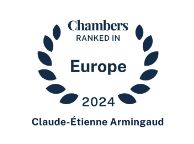Practice head(s): Claude-Etienne Armingaud
(more…)Legal 500 Rankings 2024 – Intellectual Property: Trade Marks And Designs – Tier 4
March 27th, 2024 | Posted by in Intellectual Property | Non classé | Rankings | Trademarks - (0 Comments)Legal 500 Rankings 2024 – Industry Focus: IT & the Internet – Tier 3 – France
March 27th, 2024 | Posted by in Artificial Intelligence | internet | IT | Non classé | Rankings | Software - (0 Comments)K&L Gates LLP covers a myriad of IT and internet issues, from GDRP compliance to contract negotiation. The firm is notable for its expertise in IP and data protection matters, as well as, increasingly, AI, NFT and blockchain issues. The practice is led by Claude-Etienne Armingaud, who is dual-qualified in France and the US, and is consequently well placed to handle multi-jurisdictional transactions.
Practice head(s): Claude-Etienne Armingaud
(more…)Employment Practices and Data Protection: Monitoring Workers 101
March 26th, 2024 | Posted by in Europe | Guidelines | Non classé | Privacy - (0 Comments)The Information Commissioner’s Office (ICO) has recently published guidance for employers on monitoring workers lawfully, transparently and fairly. The guidance aims to protect workers’ data protection rights and help employers to build trust with workers, customers and service users. With Artificial Intelligence (AI) on the rise, the temptation may be strong for employers to leverage those emerging technologies in that space. This alert summarizes some specific steps employers should prioritise in light of the ICO guidance.
(more…)Chambers Europe: TMT: Data Protection 2024
March 15th, 2024 | Posted by in Non classé | Privacy | Rankings - (0 Comments)

Entering Chambers Europe/France TMT: Data Protection ranking as an Up & Coming lawyer.
Client testimonials:
Claude-Étienne has a vision that goes beyond IT into other areas, so he gives multidisciplinary and strategic insights. He is also pleasant to work with and efficient.
He works really efficiently for us; he is really dedicated and clearly passionate about it too.
Source: Chambers Europe
🇺🇸 Regulating AI Part-IV: The EU AI Ac – The Expected International Impacts of the First Comprehensive AI Regulation
February 19th, 2024 | Posted by in Artificial Intelligence | Conference | Europe | Intelligence Artificielle | Legislation | Privacy - (0 Comments)Part IV of our series “Regulating AI: The Potential Impact of Global Regulation of Artificial Intelligence” will focus on recent developments in general availability of AI and how generative AI solutions are leading regulators, at a global level, to consider legal frameworks to protect both individuals affected by AI and digital sovereignty.
The program will feature a panel addressing the EU AI Act, on which a preliminary political agreement was reached last December and unanimously approved by the ambassadors of the 27 countries of the European Union on 2 February 2024, prior to its upcoming final votes.
Like the GDPR before it, the EU AI Act will be a trailblazing piece of legislation which will impact companies at global level.
Our panelists will discuss the consequences of the EU AI Act on companies contemplating the provision of AI solutions in the EU market or leveraging AI in the EU, with a special focus on non-EU companies.
Additional topics in our Regulating AI — The Potential Impact of Global Regulation of Artificial Intelligence series include:
- Part I – 13 September 2023 (EU / U.K.) – View Recording
- Part II – 7 December 2023 (Asia-Pacific Region: China, Hong Kong, Singapore, Japan) – View Recording
- Part III – 12 December 2023 (United States)
Register or watch the replay here.
Access the full text of the EU AI Act here.
ICO Introduces Consultation Series on Data Protection and Generative AI
February 13th, 2024 | Posted by in Artificial Intelligence | Europe | IT | Non classé | Privacy - (0 Comments)The Information Commissioner’s Office (ICO) recently launched a consultation series on how data protection laws should apply to the development and use of generative AI models (“Gen AI”). In the coming months, the ICO will publish further views on how to interpret specific requirements of UK GDPR and Part 2 of the DPA 2018 in relation to Gen AI. This first part of the consultation focusses on whether it is lawful to train Gen AI on personal data scraped from the web. The consultation seeks feedback from stakeholders with an interest in Gen AI.
As outlined by the ICO, web scraping will involve the collection and processing of personal data, which may not have been placed online directly by the data subjects themselves. To comply with the UK GDPR, Gen AI developers would need to ensure there is a valid lawful basis for their processing under UK GDPR, as well as comply with the relevant information requirements pertaining to indirect personal data collection.
For the first part of the consultation series, the ICO published a policy position on the lawful basis for training Gen AI models on web-scraped data which can be found here. More specifically, this consultation focusses on the ‘legitimate interest’ lawful basis under art. 6(1)(f) UK GDPR and the ‘three-part’ test that a data controller must pass to meet the legitimate interest basis (a so-called Legitimate Interest Assessment). The ICO has considered various actions that Gen AI developers could take to meet this three-part legitimate interest test to guarantee that the collection of training data through web scraping, i.e. processing of data, is complaint with the principles of UK GDPR. The ICO would now like to hear from relevant stakeholders on their view of the proposed regulatory approach and the impact this would have on their organisation. A link to the survey can be found here.
The deadline to submit a response is 1 March 2024.
First publication: K&L Gates Cyber Law Watch blog with Sophie Verstraeten
🇺🇸 Onetrust: AI Governance Masterclass – The EU AI Act
February 1st, 2024 | Posted by in Artificial Intelligence | Conference | Europe | Legislation | Non classé | Privacy - (0 Comments)
Join our session as we explore the implications of the EU AI Act. In this webinar, we’ll:
- Break down the four levels of AI risk under the AI Act
- Discuss legal requirements for deployers and providers of AI systems
- Provide a playbook for deployers and providers to accelerate EU AI Act compliance
Featured speakers
Yücel Hamzaoğlu
Partner
HHK Legal
Melike Hamzaoğlu
Partner
HHK Legal
Claude-Étienne Armingaud
Partner
KL Gates
Noshin Khan
Ethics & Compliance, Associate Director
OneTrust
Harry Chambers
Senior Privacy Analyst
OneTrust
New EU AI Rules Will Have Global Impact
January 16th, 2024 | Posted by in Artificial Intelligence | Europe | Interview | IT | Legislation | Press - (0 Comments)Quoted in Agenda article “New EU AI Rules Will Have Global Impact“:
The scope of the EU AI Act will apply to all companies whose AI systems are used or affect EU-based individuals, according to Claude-Etienne Armingaud, a partner in K&L Gates’ Paris office and a member of the law firm’s technology transactions and sourcing practice group.
Due to its breadth, global companies developing AI systems, most of which are headquartered either in the U.S. or in China, will face two options: “Get in line with the EU AI Act or abstain from the EU market,” Armingaud said.
Some companies threatened to exit the European market after the EU’s General Data Protection Regulation, or GDPR, became effective in 2018, but many didn’t actually follow through, according to Armingaud.
“So, without a doubt, all companies dabbling in AI will need to comply if they truly want to remain global,” he said.
Agenda – New EU AI Rules Will Have Global Impact
Gentle Reminder: DSA Obligations Will Apply to Online Intermediary Services Starting 17 February 2024
January 4th, 2024 | Posted by in Europe | internet | IT | Legislation - (0 Comments)It has been some time already since the EU Digital Services Act (Regulation 2022/2065, DSA) was published, and since then, the discussions about Very Large Online Platforms (VLOPs) and Very Large Online Search Engines (VLOSEs) have dominated the media coverage (see initial press release of European Commission here and coverage about VLOPs/VLOSEs petitions against categorization as VLOPs/VLOSEs here and here).
Smaller online service providers tend to forget that they may also face some new obligations under the DSA from 17 February 2024 onwards, but would be well advised to comply to avoid significant sanctions (e.g., fines of up to 6% of the global annual turnover or periodic penalty payments up to 5% of the global average daily turnover).
The following paragraphs provide a brief summary of the most relevant content of the DSA and will help online service providers to understand:
- If and to what extent the DSA applies to them;
- What specific obligations exist; and
- What sanctions may be applied in case of breach.

